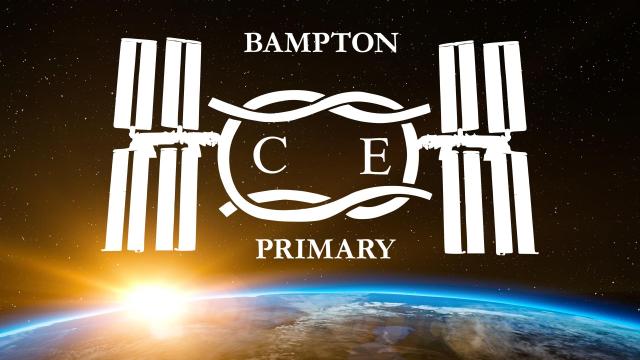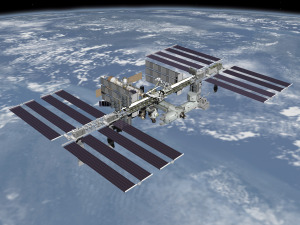 An International Space Station ARISS school contact has been planned between astronaut Drew Morgan KI5AAA and participants at Bampton School, Bampton, United Kingdom on Tuesday, October 8, 2019 at 12:51 GMT, which is 1:51 PM BST.
An International Space Station ARISS school contact has been planned between astronaut Drew Morgan KI5AAA and participants at Bampton School, Bampton, United Kingdom on Tuesday, October 8, 2019 at 12:51 GMT, which is 1:51 PM BST.
The contact between GB4BPS at the school and Drew Morgan KI5AAA operating NA1SS on the ISS will be audible across the British Isles and North Western Europe on 145.800 MHz FM.
The live stream of the event will be at https://live.ariss.org/
You can listen to the 145.800 MHz FM radio signal online from anywhere in the world by using a UK-based WebSDR such as:
SUWS Farnham WebSDR http://farnham-sdr.com/
Goonhilly https://vhf-goonhilly.batc.org.uk/
School information
Bampton Church of England Primary School, part of the Alumnis Multi Academy Trust is a is a vibrant, friendly and nurturing school, located on the edge of Exmoor National park, serving the small agricultural town of Bampton and surrounding areas of East Devon. We are part of a supportive and friendly community with strong links to our local church, ‘St Michael and All Angels.’
As a church school, our vision, ‘Believe, Belong, Become’ is embedded throughout our school and curriculum. Through core Christian values, we teach children to be able to understand and articulate their views about what they ‘believe’ and to respect the beliefs of others around them. We encourage them to understand how they ‘belong’ to family, school and the local and wider community, and how they fit into, and can impact the wider world around them. We encourage children to think about how and what they are aiming to ‘become’ as they grow, and how they are able to shape their world.
Through Christian values, together we inspire individuals to celebrate their uniqueness and empower them to become confident, aspirational, inquisitive and flourish in the modern world. We celebrate our school values of; Joy, Aiming High, Friendship, Kindness, Respect, Trust and Honesty, and Forgiveness and Compassion, and embed these values into everyday school life.
We offer an exciting, broad and balanced curriculum in a happy, stimulating environment, supported by a wide range of after school clubs and high quality, offsite residential visits. We are always seeking ways to enhance the teaching and learning experience for our children, with a breadth of experiences that develop the whole child and create a genuine love of learning. We are passionate about bringing STEM subjects to life and encouraging children to see how these subjects translate into the world beyond school.
Questions:
1. Corey (Age 7): Has the International Space Station ever suffered any damage from a meteor strike?
2. Thea (Age 9): How can space be made accessible to people with disabilities?
3. Sophie (Age 10): How long will it take you to get used to gravity again when you get home?
4. Jesse (Age 6): What would happen if I took a snowball into space?
5. Rufus (Age 8): How do you get to and from the International Space Station?
6. Alfie (Age 10): If you cut yourself in space, who acts as the doctor to fix it for you?
7. Willow (Age 10): Do you dream differently in space or dream of anything in particular?
8. Jacob (Age 10): If I kick a football in space, how far would it travel?
9. Maya (Age 9): When you were a child did you want to go to space and is there anything that disappointed you about it?
10. Hetty (Age 8): What does it feel like when you are in a rocket and you are about to get shot into space?
11. Corey asking Oliver’s question (Age 9): If you could make one improvement to the International Space Station, what would it be?
12. Thea asking Nancy’s question (Age 5): The International Space Station travels at 5 miles per second, can you feel it moving when travelling fast like you can on earth?
13. Sophie asking Eban’s question (Age 6): The International Space Station is so fast, how does it not crash into the other satellites that are also in orbit?
14. Jesse asking Sorrel’s question (Age 9): Did you have any concerns looking back at Earth for the first time?
15. Rufus asking Macy’s question (Age 9): How many planets have you seen from the International Space Station?
16. Alfie asking Ellie’s question (Age 10): If you could grow any plant in the International Space Station what would it be?
17. Willow asking Eve’s question (Age 10): How long have you been on the International Space Station and how long do you think you could stay there for?
18. Jacob asking Johnny’s question (Age 6): What time goes your clock show on the Space Station? Is it USA, UK, Russian or Japan time?
19. Maya asking Ruan’s question (Age 9): Do you get to keep your customised seat or anything else as a souvenir of your trip?
20. Hetty asking William’s question (Age 8): We are getting aware about the amount of rubbish on earth, are you worried about the amount of space junk and can you see it?
About ARISS:
Amateur Radio on the International Space Station (ARISS) is a cooperative venture of international amateur radio societies and the space agencies that support the International Space Station: NASA, Russian Space Agency, ESA, JAXA, and CSA. The US Center for the Advancement of Science in Space (CASIS) and the National Aeronautics and Space Administration (NASA) provide ARISS special support.
ARISS offers an opportunity for students to experience the excitement of Amateur Radio by talking directly with crewmembers on board the International Space Station. Teachers, parents and communities see, first hand, how Amateur Radio and crewmembers on ISS can energize youngsters’ interest in science, technology, and learning.
The primary goal of ARISS is to promote exploration of science, technology, engineering, and mathematics (STEM) topics by organizing scheduled contacts via amateur radio between crew members aboard the ISS and students in classrooms or informal education venues. With the help of experienced amateur radio volunteers, ISS crews speak directly with large audiences in a variety of public forums. Before and during these radio contacts, students, teachers, parents, and communities learn about space, space technologies, and amateur radio.
73 Gaston Bertels – ON4WF
For more information on ARISS, see http://www.ariss.org/
How to hear the ISS https://amsat-uk.org/beginners/how-to-hear-the-iss/
Bampton School
https://bamptonschool.org/the-news-weve-all-been-waiting-for/
https://twitter.com/BamptonSCH/
Exmoor Magazine – Eyes to the Skies in Devon
https://www.exmoormagazine.co.uk/eyes-to-the-skies-in-devon/
Click here for original story, ISS contact planned for Bampton School in Devon
Source: Amsat UK
